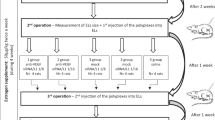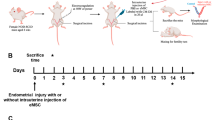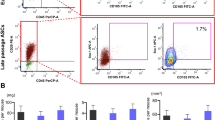Abstract
This study was undertaken to study the efficiency of Adsflt-1 engineered human eutopic mesenchymal stem cells (MSCs) secreting anti-angiogenic sFlt-1 as a targeted cell-based therapy for endometriosis (EM). Eutopic MSCs were transduced with Adsflt-1/AdV0 viral vectors and were evaluated for expression and secretion of sFlt-1. EM was created in NOD/SCID mice using subcutaneous implantation techniques. Four doses of 106 MSC-Adsflt-1/MSC-AdV0 were administered to the model and therapeutic anti-angiogenic ability was analyzed by lesion size measurement, microvessel density, immunohistochemistry and real-time reverse transcriptase-PCR analysis. Approximately 86% of transduced MSCs expressed and secreted sFlt-1. MSC-Adsflt-1-treated animals exhibited significant reduction (52.8±1.8%) in size of endometriotic lesions. We observed a 2.3-fold decrease in the number and a 10-fold decrease in the size of endometrial glands in MSC-Adsflt-1-treated animals. A two-fold decrease in stromal cell densities was also observed in MSC-Adsflt-1-treated animals compared with the MSC-AdV0 group. Specific positive immunostaining for MSC marker, CD146 and sFlt-1 in the lesion sites of the MSC-Adsflt-1 group suggests possible homing of transduced MSCs, their survival and secretion of sFlt-1 at the target sites. A marked reduction in size of microvessels and microvessel density within endometriotic lesions and surrounding host subcutaneous layers was observed in MSC-Adsflt-1 group along with significantly downregulated expression of transcripts for vascular endothelial growth factor, fetal liver kinase 1 and matrix metalloproteinases (2 and 9). Our findings indicate the efficacy of a novel eutopic MSC-Adsflt-1 therapy in EM study models. Evaluating long-term effects of genetically modified MSCs in vivo is essential in translating MSC-Adsflt-1 therapy to the clinics.










Similar content being viewed by others
References
Esmaeilzadeh S, Mirabi P, Basirat Z, Zeinalzadeh M, Khafri S . Association between endometriosis and hyperprolactinemia in infertile women. Iran J Reprod Med 2015; 13: 155–160.
Capobianco A, Rovere-Querini P . Endometriosis, a disease of the macrophage. Front Immunol 2013; 28: 1–14.
Platteeuw L, D'Hooghe T . Novel agents for the medical treatment of endometriosis. Curr Opin Obstet Gynecol 2014; 26: 243–252.
Sourial S, Tempest N, Hapangama DK . Theories on the pathogenesis of endometriosis. Int J Reprod Med 2014; 2014: 179515.
Djokovic D, Calhaz-Jorge C . Angiogenesis as a therapeutic target in endometriosis. Acta Med Port 2014; 27: 489–497.
Wang H, Gorpudolo N, Li Y, Feng D, Wang Z, Zhang Y . Elevated vascular endothelial growth factor-A in the serum and peritoneal fluid of patients with endometriosis. J Huazhong Univ Sci Technolog Med Sci 2009; 29: 637–641.
Li YZ, Wang LJ, Li X, Li SL, Wang JL, Wu ZH et al. Vascular endothelial growth factor gene polymorphisms contribute to the risk of endometriosis: an updated systematic review and meta-analysis of 14 case-control studies. Genet Mol Res 2013; 2: 1035–1044.
Jiang Y, Tang JY, Wu Y, Zhao TF . Vascular endothelial growth factor gene polymorphisms and the risk of endometriosis: a systematic review. Zhonghua Fu Chan Ke Za Zhi 2012; 47: 179–184.
Marí-Alexandre J, García-Oms J, Barceló-Molina M, Gilabert-Aguilar J, Estellés A, Braza Boils A et al. microRNAs and angiogenesis in endometriosis. Thromb Res 2015; Suppl 1: S38–S40.
Koippallil Gopalakrishnan Nair AR, Pandit H, Warty N, Madan T . Endometriotic mesenchymal stem cells exhibit a distinct immune phenotype. Int Immunol 2015; 27: 195–204.
Ferrero S, Ragni N, Remorgida V . Antiangiogenic therapies in endometriosis. Br J Pharmacol 2006; 149: 133–135.
Nap AW, Griffioen AW, Dunselman GA, Bouma-Ter Steege JC, Thijssen VL, Evers JL et al. Antiangiogenesis therapy for endometriosis. J Clin Endocrinol Metab 2004; 89: 1089–1095.
Xu H, Becker CM, Lui WT, Chu CY, Davis TN, Kung AL et al. Green tea epigallocatechin-3-gallate inhibits angiogenesis and suppresses vascular endothelial growth factor C/vascular endothelial growth factor receptor 2 expression and signaling in experimental endometriosis in vivo. Fertil Steril 2011; 96: 1021–1028.
Shibuya M . Vascular endothelial growth factor and its receptor system: physiological functions in angiogenesis and pathological roles in various diseases. J Biochem 2013; 153: 13–19.
Bainbridge JWB, Mistry A, De Alwis M, Paleolog E, Baker A, Thrasher AJ et al. Inhibition of retinal neovascularization by gene transfer of soluble VEGF receptor sFlt-1. Gene Therapy 2002; 9: 320–326.
May KE, Conduit-Hulbert SA, Villar J, Kirtley S, Kennedy SH, Becker CM . Peripheral biomarkers of endometriosis: a systematic review. Hum Reprod Update 2010; 16: 651–674.
Igarashi T, Miyake K, Masuda I, Takahashi H, Shimada T . Adeno-associated vector (type 8)-mediated expression of soluble Flt-1 efficiently inhibits neovascularization in a murine choroidal neovascularization model. Hum Gene Ther 2010; 21: 631–637.
Sopo M, Anttila M, Sallinen H, Tuppurainen L, Laurema A, Laidinen S et al. Antiangiogenic gene therapy with soluble VEGF-receptors -1, -2 and -3 together with paclitaxel prolongs survival of mice with human ovarian carcinoma. Int J Cancer 2012; 131: 2394–2401.
Hu M, Yang JL, Teng H, Jia YQ, Wang R, Zhang XW et al. Anti-angiogenesis therapy based on the bone marrow-derived stromal cells genetically engineered to express sflt-1 in mouse tumor model. BMC Cancer 2008; 8: 306–316.
Lai CM, Shen WY, Brankov M, Lai YK, Barnett NL, Lee SY et al. Long-term evaluation of AAV-mediated sflt-1 gene therapy for ocular neovascularization in mice and monkeys. Mol Ther 2005; 12: 659–668.
Mahasreshti PJ, Navarro JG, Kataram M, Wang MH, Carey D, Siegal GP et al. Adenovirus-mediated soluble FLT-1 gene therapy for ovarian carcinoma. Clin Cancer Res 2001; 7: 2057–2066.
Yoshimura I, Mizuguchi Y, Miyajima A, Asano T, Tadakuma T, Hayakawa M . Suppression of lung metastasis of renal cell carcinoma by the intramuscular gene transfer of a soluble form of vascular endothelial growth factor receptor. I J Urol 2004; 171: 2467–2470.
Afuwape AO, Feldman M, Paleolog EM . Adenoviral delivery of soluble VEGF receptor 1 (sFlt-1) abrogates disease activity in murine collagen-induced arthritis. Gene Therapy 2003; 10: 1950–1960.
Mae M, Crystal RG . Gene transfer to the pleural mesothelium as a strategy to deliver proteins to the lung parenchyma. Hum Gene Ther 2002; 13: 1471–1482.
Mahasreshti PJ, Kataram M, Wang MH, Stockard CR, Grizzle WE, Carey D et al. Intravenous delivery of adenovirus-mediated soluble FLT-1 results in liver toxicity. Clin Cancer Res 2003; 9: 2701–2710.
Park JS, Suryaprakash S, Lao YH, Leong KW . Engineering mesenchymal stem cells for regenerative medicine and drug delivery. Methods 2015; 15: 1046–2023.
Tanna T, Sachan V . Mesenchymal stem cells: potential in treatment of neurodegenerative diseases. Curr Stem Cell Res Ther 2014; 9: 513–521.
Yang J, Huang F . Stem cell and endometriosis: new knowledge may be producing novel therapies. Int J Clin Exp Med 2014; 7: 3853–3858.
Kao AP, Wang KH, Chang CC, Lee JN, Long CY, Chen HS et al. Comparative study of human eutopic and ectopic endometrial mesenchymal stem cells and the development of an in vivo endometriotic invasion model. Fertil Steril 2011; 15: 1308–1315.
Sasson IE, Taylor HS . Stem cells and the pathogenesis of endometriosis. Ann NY Acad Sci 2008; 1127: 106–115.
Laschke MW, Menger MD . Anti-angiogenic treatment strategies for the therapy of endometriosis. Hum Reprod Update 2012; 18: 682–702.
Hull ML, Charnock-Jones DS, Chan CL, Bruner-Tran KL, Osteen KG, Tom BD et al. Antiangiogenic agents are effective inhibitors of endometriosis. J Clin Endocrinol Metab 2003; 88: 2889–2899.
Amari A, Ebtekar M, Moazzeni SM, Soleimani M, Amirabad LM, Tahoori MT et al. Investigation of immunomodulatory properties of human Wharton's Jelly-derived mesenchymal stem cells after lentiviral transduction. Cell Immunol 2015; 293: 59–66.
Chuang CK, Wong TH, Hwang SM, Chang YH, Chen GY, Chiu YC et al. Baculovirus transduction of mesenchymal stem cells: in vitro responses and in vivo immune responses after cell transplantation. Mol Ther 2009; 17: 889–896.
Lee S, Choi E, Cha MJ, Hwang KC . Cell adhesion and long-term survival of transplanted mesenchymal stem cells: a prerequisite for cell therapy. Oxid Med Cell Longev 2015 2015: 632902.
Kean TJ, Lin P, Caplan AI, Dennis JE . MSCs: delivery routes and engraftment, cell-targeting strategies, and immune modulation. Stem Cells Int 2013; 2013: 732742.
Murphy MB, Moncivais K, Caplan AI . Mesenchymal stem cells: environmentally responsive therapeutics for regenerative medicine. Exp Mol Med 2013; 15: 45 e54.
Liu B, Wang NN, Wang ZL, Hong SS, Li JT, Ding HJ et al. Improved nude mouse models for green fluorescence human endometriosis. J Obstet Gynaecol Res 2010; 36: 1214–1221.
Yuan DP, Gu L, Long J, Chen J, Ni J, Qian N et al. Shikonin reduces endometriosis by inhibiting RANTES secretion and mononuclear macrophage chemotaxis. Exp Ther Med 2014; 7: 685–690.
Osteen KG, Yeaman GR, Bruner-Tran KL . Matrix metalloproteinases and endometriosis. Semin Reprod Med 2003; 21: 155–164.
Acknowledgements
We are grateful to Dr Ronald Crystal for being generous in providing the Adsflt-1 vector. We also thank Dr SD Mahale, Director, NIRRH, Mumbai for providing necessary facilities for research. Ms Sushama, Ms Gayatri and Dr S Mukherjee are acknowledged for their help in flow cytometry and Ms Reshma, Ms Shobha and Dr N. Balasinor for help in confocal microscopy. We thank Mr Vaibhav, graphics expert, for his help in improving the resolution of figures. This work was supported by the Post-doctoral fellowship program of the Indian Council of Medical Research, New Delhi, India.
Author information
Authors and Affiliations
Corresponding author
Ethics declarations
Competing interests
The authors declare no conflict of interest.
Additional information
Supplementary Information accompanies this paper on Gene Therapy website
Rights and permissions
About this article
Cite this article
Koippallil Gopalakrishnan, A., Pandit, H., Metkari, S. et al. Adenoviral vector encoding soluble Flt-1 engineered human endometrial mesenchymal stem cells effectively regress endometriotic lesions in NOD/SCID mice. Gene Ther 23, 580–591 (2016). https://doi.org/10.1038/gt.2016.30
Received:
Revised:
Accepted:
Published:
Issue Date:
DOI: https://doi.org/10.1038/gt.2016.30
- Springer Nature Limited
This article is cited by
-
Anti-angiogenic treatment of endometriosis via anti-VEGFA siRNA delivery by means of peptide-based carrier in a rat subcutaneous model
Gene Therapy (2018)
-
Gene Delivery Approaches for Mesenchymal Stem Cell Therapy: Strategies to Increase Efficiency and Specificity
Stem Cell Reviews and Reports (2017)




